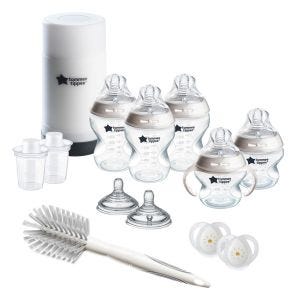
This is a demo store. No orders will be fulfilled.
Subscription orders can be cancelled at anytime. Free delivery on all subsequent subscription orders. Find out more about subscriptions.
They’re easy and fuss free
Your products are automatically sent to you
You save up to 10% when you sign up for a subscription
You can cancel at any time
As a soon-to-be parent, you're probably wondering what to expect in the third trimester of your pregnancy. This final stretch can be both exciting and challenging, as your body undergoes significant changes in preparation for childbirth. From physical symptoms to emotional changes, there are a lot of things that can happen during this time.
In this blog post, we'll explore what you can expect in the third trimester and how you can prepare for the arrival of your little one. So, let's dive in and get ready for the final countdown!
The third trimester starts when the second trimester ends. It begins at the start of the 28th week of pregnancy.
The third trimester lasts for 12 weeks.
Welcome to the third trimester, it's almost time to meet your baby!
Let's cover some of the common third-trimester symptoms that pregnant people experience to help guide you through the final months.
During the third trimester of pregnancy, a lot of changes happen week by week. Over the last few months of pregnancy, a baby puts on weight quickly and their body gradually gets more in proportion.
At 28 weeks, your baby is about the size of an eggplant and is starting to open and close their eyes. They can distinguish between light and dark and may startle at loud sounds and sense changes in light.
By 32 weeks, they are about the size of a squash and can blink, hiccup, and even dream. And at 36 weeks, they'll continue to make lots of movements. By this point, a baby is the size of a honeydew melon, and they usually start preparing for birth by moving into the head-down position.
It's important to continue to attend regular prenatal appointments during the third trimester to monitor your baby's growth and ensure that everything is progressing as it should.
Feeling your baby move during the third trimester is one of the best signs that your pregnancy is going well at this late stage.
If you do notice your little one's movements changing and you're at all concerned, it's best to reach out to your doctor and they will be able to carry out any checks - such as a kick count - to confirm that everything is ok.
It's normal to have worries as you reach the end of your pregnancy, but the major things to look out for during the third trimester are:
You should seek advice from your medical care team as soon as possible if you have any of the above during your third trimester.
Many pregnant people understandably find it harder to stay active as their bump grows bigger. During the final stages of pregnancyit's great to carry on gentle exercises like walking and it's also a great time to practice pelvic floor exercises or Kegels to help maintain muscle tone and prevent urinary incontinence.
Swimming can also help soothe aches caused by your growing bump and gives you a few minutes of feeling weightless - what a relief!
Although it's great to stay active, as with any other stage of pregnancy, it's important to listen to your body during the third trimester and rest whenever you need to. Whenever you can, seize the opportunity to chill and do whatever helps you relax, maybe that's a warm bath, a pregnancy massage, or watching some TV while cradling your bump.
The third trimester lasts for three months.
We asked our Instagram followers what the third trimester felt like for them, and here's what they told us: